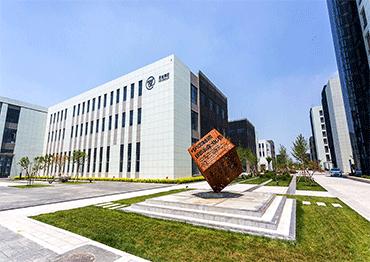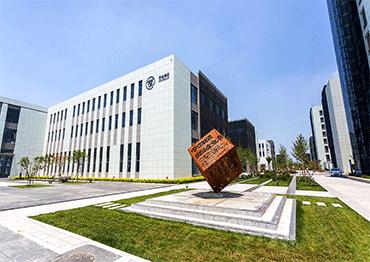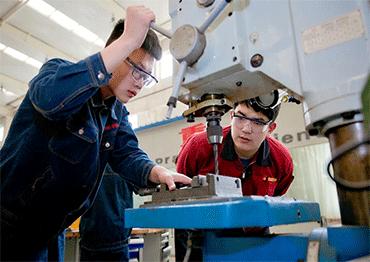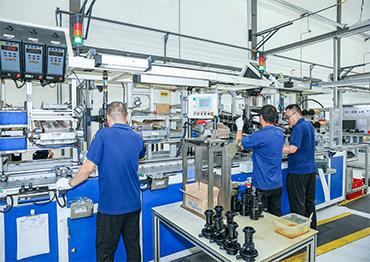Li Tao, vice director of the management committee of the Jinan Innovation Zone, remembered when he brought the first group of prospective German clients to the site seven years ago.
“There was not even any level land,” Li said.
Before the company representatives arrived, they flattened out the land and paved it. However, their efforts were initially met with skepticism.
“The negotiations were tough. We could only convince them through our clearly positioned industrial plans and pledges of optimal policy support,” Li said.
Though starting from scratch, the zone was built according to international standards to accommodate major projects. Renowned planning companies were brought in to create an industrial map and design plants.
“We hoped to attract projects dedicated to practical industrial development that could stimulate local economic development instead of speculative real estate developers,” Li said.
BMTS Technology, a high-tech automotive components manufacturer based in Stuttgart, was the first to settle in the Jinan Innovation Zone in 2019 after rounds of tough negotiations. “It was big news at that time,” Li said.
Previously, Taicang was the top destination for German enterprises entering China thanks to its advantage in ports and geographical proximity to Shanghai. “We could only attract German enterprises by offering precise industrial planning, consistent efforts and good services,” Li said.
“Jinan boasts a comprehensive industrial system covering 41 industries and 31 manufacturing categories, which is rare even nationwide. It has the essentials for developing the real economy, with ample industrial facilities and talent,” Li added.
In 2011, Germany introduced Industrie 4.0, a concept that involves a comprehensive digital transformation of the manufacturing industry. “It aligns well with China’s ‘Made in China 2025’ national strategy for developing the manufacturing sector,” Li said.
The Jinan Innovation Zone stands out as an exceptional transportation hub, accessible through high-speed rail, freight rail and air, but also a river that provides a direct route to coastal ports.
European freight trains departing from Jinan have extended their reach to over 40 cities across 20 European and Asian countries. On December 28, 2023, Jinan celebrated the departure of its 1,000th China-Europe freight train. To accommodate the growing transportation demand, both the expressway and airport are undergoing expansion.
To better serve its companies, the Jinan Innovation Zone has continuously worked toward streamlining its services. A notable example occurred in 2018, when the zone established a “one-stop” process for business registration and industrial and commercial registration for foreign-funded enterprises. In 2020, the registration process was further simplified, allowing the establishment of foreign-funded enterprises to be completed solely through the industrial and commercial department.
The zone also provides customized, hands-on services for foreign investment projects. In 2019, it took nine months for BMTS Technology to go from signing to production, including establishing an Industrie 4.0-compliant factory. For Hengst, it only took three months.
What’s more, the local government has been actively working to build new housing, hotels and hospitals, aiming to offer enterprises within the zone first-class living accommodations and business services.
The Jinan Innovation Zone is also committed to elevating the standards of intellectual property creation, utilization, protection, management and services. It has been recognized as a national-level demonstration zone for building a robust intellectual property ecosystem. The zone’s overseas intellectual property service platform provides services to 65 countries and regions worldwide.
The Cooperation Zone has emerged as a paradigm for international manufacturing cooperation, housing four industrial parks. As of late 2023, the zone’s 1,300 enterprises generate 50,000 jobs. Renowned German industry leaders such as Bosch, Continental, VOSS and Hengst have all experienced remarkable success in their fields within the zone.
Between 2016 and 2023, fixed investment in the zone rose from 7.69 billion yuan (US$1.08b) to 21.3 billion yuan (US$2.98b), while the value of industrial output surged nearly five times from 4.1 billion yuan (US$574.1m) to 20 billion yuan (US$2.8b) in the past six years, according to data from the Jinan Innovation Zone management committee.
These successes boosted growth in the Jinan Innovation Zone and the city of Jinan. In 2022, the Jinan Innovation Zone’s total output value surpassed 160 billion yuan (US$22.4b), while its total import and export value accounted for over 50 percent of the city’s total and one-third of Jinan’s foreign investment.
By October 2023, 86 Fortune Global 500 companies had invested in Jinan. Between January and September 2023, 193 foreign companies settled in Jinan, a year-on-year increase of 14.2 percent. The city’s actual utilization of foreign investment reached US$2.2 billion, ranking second in Shandong in terms of total volume.

 Old Version
Old Version


